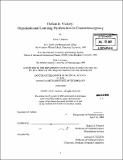| dc.contributor.advisor | Roger D. Peterson. | en_US |
| dc.contributor.author | Jackson, Colin F. (Colin Francis) | en_US |
| dc.contributor.other | Massachusetts Institute of Technology. Dept. of Political Science. | en_US |
| dc.date.accessioned | 2010-03-25T14:57:54Z | |
| dc.date.available | 2010-03-25T14:57:54Z | |
| dc.date.copyright | 2008 | en_US |
| dc.date.issued | 2008 | en_US |
| dc.identifier.uri | http://hdl.handle.net/1721.1/53077 | |
| dc.description | Thesis (Ph. D.)--Massachusetts Institute of Technology, Dept. of Political Science, 2008. | en_US |
| dc.description | Includes bibliographical references. | en_US |
| dc.description.abstract | Two puzzles dominate the study of organizational learning and counterinsurgency. First, militaries often struggle to develop effective strategies to address the problem of counterinsurgency. Second, their strategic performance seldom improves over successive counterinsurgency campaigns. This study offers a theoretical explanation for these dominant patterns of learning dysfunction. It argues that a set of closely held, professional beliefs - the military operational code - and bureaucratic preferences distort the organizations' initial response, subsequent adaptation and interwar retention. The military operational code leads militaries to misunderstand counterinsurgency in a systematic and debilitating fashion; bureaucratic interests lead them to reject the most effective strategies once they have been uncovered. When militaries manage to break with this dysfunctional pattern, it because their professional judgment is constrained; high civilian participation and/or resource scarcity force often force militaries to adopt political strategies that are less congenial but more effective in restoring state authority. This study tests the theory against six empirical cases: Indochina, the Indochina-Algeria interlude, Algeria, British Palestine, Malaya, and Thailand. These cases strongly suggest that the dysfunctional learning patterns are the product of broadly shared, professional beliefs and bureaucratic interests rather than the common, alternative explanations based on experience, culture or normative and material constraints. | en_US |
| dc.description.statementofresponsibility | by Colin F. Jackson. | en_US |
| dc.format.extent | 2 v. (573 leaves) | en_US |
| dc.language.iso | eng | en_US |
| dc.publisher | Massachusetts Institute of Technology | en_US |
| dc.rights | M.I.T. theses are protected by
copyright. They may be viewed from this source for any purpose, but
reproduction or distribution in any format is prohibited without written
permission. See provided URL for inquiries about permission. | en_US |
| dc.rights.uri | http://dspace.mit.edu/handle/1721.1/7582 | en_US |
| dc.subject | Political Science. | en_US |
| dc.title | Defeat in victory : organizational learning dysfunction in counterinsurgency | en_US |
| dc.title.alternative | Organizational learning dysfunction in counterinsurgency | en_US |
| dc.type | Thesis | en_US |
| dc.description.degree | Ph.D. | en_US |
| dc.contributor.department | Massachusetts Institute of Technology. Department of Political Science | |
| dc.identifier.oclc | 501950391 | en_US |
